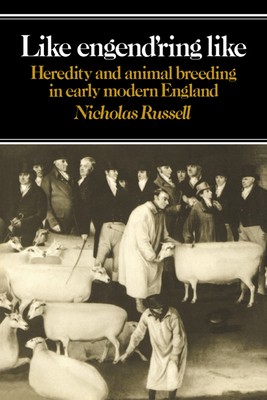
- We will send in 10–14 business days.
- Author: Nicholas Russell
- Publisher: Cambridge University Press
- ISBN-10: 0521031583
- ISBN-13: 9780521031585
- Format: 15.6 x 23.4 x 1.5 cm, minkšti viršeliai
- Language: English
- SAVE -10% with code: EXTRA
Reviews
Description
Robert Bakewell of Dishley Grange in Leicestershire is usually regarded as the founding father of modern farm livestock breeding, and is thought of as one of the legendary pioneers of the agricultural revolution in late eighteenth-century Britain. However, Bakewell was by no means the first English breeder to practise deliberate selection of desirable qualities in his livestock. This book sets out to examine the ideas and techniques of earlier generations of agricultural and sporting improvers in the seventeenth and eighteenth centuries, and to demonstrate the earlier sources of many of Bakewell's opinions and procedures. It reviews the relationships which may have existed between the ideas of practical animal breeders and those of philosophical naturalists with theoretical ideas about heredity. It also touches on the question of whether the stimulus for the development of new stock was provided by demand for different products or by a desire to obtain knowledge about the heredity of domestic animals.
EXTRA 10 % discount with code: EXTRA
The promotion ends in 23d.08:16:02
The discount code is valid when purchasing from 10 €. Discounts do not stack.
- Author: Nicholas Russell
- Publisher: Cambridge University Press
- ISBN-10: 0521031583
- ISBN-13: 9780521031585
- Format: 15.6 x 23.4 x 1.5 cm, minkšti viršeliai
- Language: English English
Robert Bakewell of Dishley Grange in Leicestershire is usually regarded as the founding father of modern farm livestock breeding, and is thought of as one of the legendary pioneers of the agricultural revolution in late eighteenth-century Britain. However, Bakewell was by no means the first English breeder to practise deliberate selection of desirable qualities in his livestock. This book sets out to examine the ideas and techniques of earlier generations of agricultural and sporting improvers in the seventeenth and eighteenth centuries, and to demonstrate the earlier sources of many of Bakewell's opinions and procedures. It reviews the relationships which may have existed between the ideas of practical animal breeders and those of philosophical naturalists with theoretical ideas about heredity. It also touches on the question of whether the stimulus for the development of new stock was provided by demand for different products or by a desire to obtain knowledge about the heredity of domestic animals.


Reviews